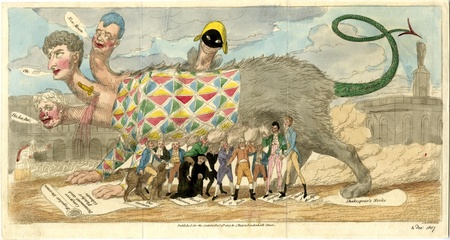New online volume of pedagogical reflections co-edited by lecturer in music Jo Hicks and Sarah Burdett (UCL)
While the origins of melodrama are notoriously complex, it is most commonly linked with France and the tumult of the revolutionary and Napoleonic wars. By the early 1800s the sensational genre was proliferating on European as well as British stages. Seminal studies exploring the genre’s origins, form and reception have been accompanied in recent decades by a rich corpus of scholarship interrogating the political and cultural potency of the genre, by unpacking its idiosyncratic dealings with modern social categories including class, race, and gender. A multimedia genre, combining text, music, and spectacular extravagance, melodrama has come to occupy significant space in explorations of Romanticism by scholars of literature, theatre, music, and visual culture. A transnational genre, too, conglomerating a range of European theatrical traditions, melodrama invites us to grapple with Romantic conceptions of nationhood, cosmopolitanism, and otherness. As such, the ground is well-laid for the study of melodrama to be incorporated with prominence into the teaching of Romantic period culture across university programmes hosted by a range of departments and faculties. A new volume of short articles, co-edited by Sarah Burdett (UCL) and Jo Hicks (Aberdeen), is hosted by the open access Romantic Textualities site: https://www.romtext.org.uk/teaching-romanticism-xxxvi-romantic-melodrama/
Testament to the rich malleability of melodrama within a teaching context, this volume comprises contributions from six scholars who have taught Romantic melodrama from a variety of national, disciplinary, and methodological perspectives. The articles address pedagogical approaches to the teaching of French, German, and British melodrama; with emphasis placed varyingly on music, performance history, and theatrical texts and contexts; and with a balance of theory-based and practice-led techniques. Together, these articles serve not only to vindicate the importance of melodrama in deepening students’ understanding of Romantic-period culture, but they also illustrate the possibilities offered by the genre for creative and original learning experiences. By allowing students to experience the sensorial thrills and wide-scale social and cultural impact of this dynamic and exhilarating form, teachers can help foster an enthusiasm for Romanticism as a movement.


